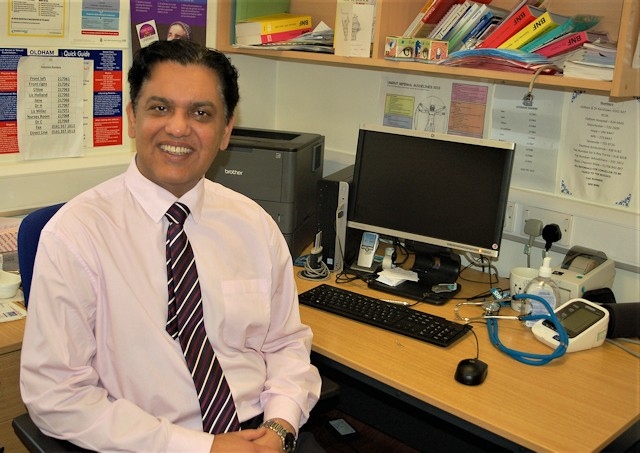Life-saving early detection put at risk by Covid-19 infection fears
Date published: 13 May 2020

Dr Chauhan
99% of healthcare professionals, including those working in primary settings such as surgeries in Greater Manchester, are concerned that patients are missing out on a potentially life or death diagnosis - because they are too scared to attend appointments during the Covid-19 outbreak.
In addition, 45% of healthcare professionals fear that having to work remotely via video-link or telephone means they could be failing to detect serious diseases in patients.
So says the first survey on the impact of the pandemic on primary healthcare outlets, published today on the Guidelines in Practice website.
Early detection can stop conditions such as bowel cancer from becoming deadly and slow down and even reverse Alzheimer’s.
Almost half of respondents were deeply concerned about the impact of the pandemic on patients' mental health, which could result in conditions such as depression and anxiety spiralling into self-harm and even suicide.
Far from being overrun during Covid-19, 40% of health care professionals are less busy than usual and a further 15% claim they are considerably quieter.
“More than 90% of women diagnosed early with ovarian cancer survive for 5 years or more, whereas just 5% live that long when diagnosed later” said Ivor Eisenstadt, Managing Director of MGP, who conducted the study, “the same need for early detection applies to most cancers, cardiovascular disease and viral infections including HIV. People with important symptoms are not consulting their GP and instead are playing dice with their own health.”
The survey, which quizzed over 400 UK primary healthcare professionals, (including those working within Covid-19 hubs) showed that the virus has made a huge change to the way most surgeries work, with 89% of doctors doing some or all of their non-Covid-19 consultations via telephone.
Dr Zahid Chauhan OBE is a local GP who has worked on the frontline in the battle against Covid-19. He said: "I am concerned that patients are not turning up at surgery. I largely think this is through fear but also a desire not to bother the NHS at this critical time. People must attend if they display worrying symptoms. Of particular concern is patients not presenting with mental health issues. There is a stigma around problems such as depression at the best of times. I genuinely believe people are suffering in silence."
Ivor Eisenstadt concluded: "What this survey shows is that primary healthcare professionals have compassion for patients and recognise that other serious illnesses don’t go away just because we are in the middle of a pandemic. With innovations such as more online appointments and telephone triage, our healthcare professionals are also showing that they are adaptable, professional and wholly dedicated to their patients, whether they have COVID-19 symptoms or not."
Do you have a story for us?
Let us know by emailing news@rochdaleonline.co.uk
All contact will be treated in confidence.
Most Viewed News Stories
- 1Newhey's Char Steakhouse and Bank Chamber close with immediate effect
- 2Two men arrested after police chase ends up in Middleton river
- 3Six men arrested in Rochdale child exploitation investigation
- 4Man charged in connection with assault on Christmas Eve in Sudden
- 5Six men charged in connection with child exploitation investigation
To contact the Rochdale Online news desk, email news@rochdaleonline.co.uk or visit our news submission page.
To get the latest news on your desktop or mobile, follow Rochdale Online on Twitter and Facebook.


